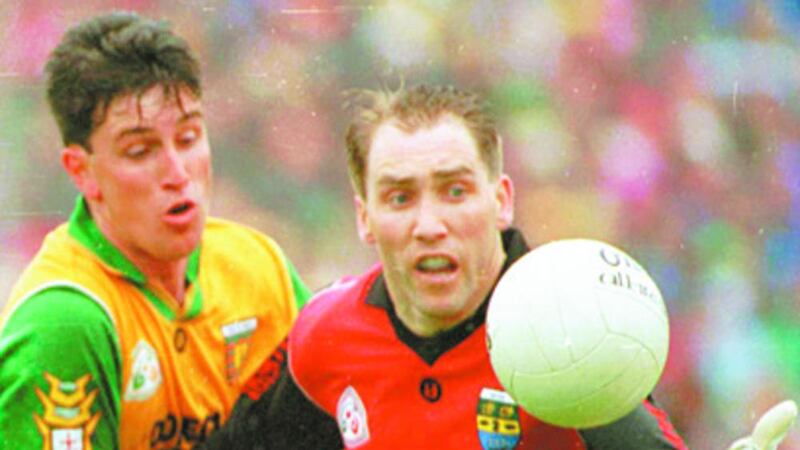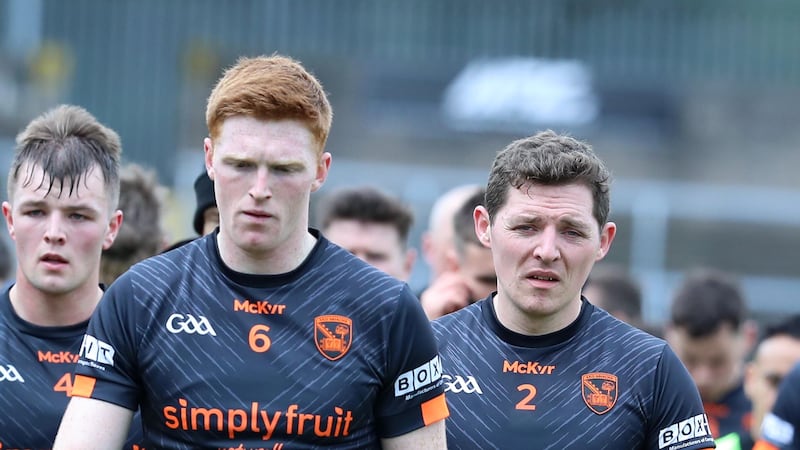IT’S always been a difficult proposition. How do you manage talent?
In most sports, egos can dominate a changing room and team, heads swelling to match their talent. A manager’s biggest challenge is managing this talent. Managing the talent in a way that appears strong, however aspiring never to dominate the person and cause division.
I recently read an excellent article on managing talent. While I could never characterise my fellow columnist Benny Tierney as ‘talented,’ these types of players could be more characterised as foot soldiers that are easily managed and are glad to be involved at the elite levels of respective sporting codes.
When I say talent, I refer to the player who can win a game on his own, when he wants to, of course. Every club had one. Indeed, every county had one. The manager knew that, if this player turned up, the game would be a certainty. The individual maestro had the ability to dominate a game and, usually, the first five minutes gave us an indication of what was to be expected.
Perhaps the talent would arrive late, forget his socks, sleep in, arrive suffering the effects of an alcopop or two or being up all night in conversation with an individual of the opposite sex. It became a toss-up of what we expected from him. While some team-mates would snigger with sheer disbelief, you had the dedicated few who shook their head in disgust, knowing that they sacrificed a romantic Chinese or night out in preparation for the game.
I remember one opening game in the Ulster Championship. It was a strange game, where, at times, our opponents looked like they could provide a real challenge. Eventually, in the second half we pulled away and it became a more comfortable afternoon than we had predicted.
Up until the game, we had assumed a certain player would be playing full-forward. He had been scoring freely and would provide a real handful, especially from dead-balls. This lad never started, but he made a cameo appearance in the second half, the first man I ever saw running on wearing a pair of ankle socks.
Our goalkeeper Brendy McVeigh, a larger-than-life player, director of social operations on the team, quipped to him, ‘Hey boy, I hear you’re a wild man on a night out, must get out with you some night,’ to which this player replied, ‘You should have come down last night then, was carried out of it’. I guess we all realised that the player in question never started because of this very reason. Every manager would testify that certain characters are extremely difficult to manage.
At times, I was difficult to manage in my last few years. When I heard something I didn’t want to hear from the medical team, I would go elsewhere to find the answers. Probably not the smartest thing to do and the effects of this undermining process became more difficult to repair, especially when you were not playing.
In 2004, Frank Lampard emerged naked from the showers. Suddenly, Jose Mourinho popped up and looked him meaningfully in the eye. ‘Alright, boss?’ asked Lampard. ‘You are the best player in the world,’ replied Mourinho. The naked footballer didn’t know what to say. 'You are the best player in the world. But now you have to prove it and win trophies’.
As a player, I always welcomed a manager asking me my opinion on various matters. This happened on a few occasions as time went on and I always appreciated that they thought enough of me to ask for my opinion. I think some managers can develop a professor/teacher authoritative style without realising that they are dealing with adults, not children.
A simple philosophy is asking talent for advice, but only advice allows talent to motivate themselves and develop a programme of individual development, such as Mourinho concluded with Frank Lampard. Peter Canavan, Mickey Linden, Colm Cooper were all great players. The managers who made these men great knew that all players, on their day, can win them those games.
Linden famously said in the changing room of Croke Park in 1994 against Dublin, ‘Lads, give me the ball and I will do the rest’. Mickey was the easiest of talent to manage, a professional, he motivated himself and that is why he played into his 40s. But he also had managers who helped him achieve legendary status.
Peter Canavan, in 2005, kicked a free into Hill 16 against Armagh, when perhaps Owen Mulligan felt he could have done likewise. The rest is history, and that kick merely cemented Canavan’s career as a modern-day great.
Unfortunately, in the days of total dedication and military-like regimes, the chances of players like Linden, Canavan, and 'the Gooch’ Cooper starring are being eradicated by defensive systems and over-training. The days of one-on-one defending and players spinning past defenders are being eradicated. Managers have become afraid of 'indulging' talent.
I always felt Maurice Fitzgerald’s talent was never truly appreciated by the great Páidí Ó Sé and the difficulty of this relationship was perhaps a factor as to why Fitzgerald never played as much as he should have.
Last Sunday, Conor McManus dragged Monaghan through a game they just about deserved to win. The difference is Cavan did not have anyone like McManus, although Martin Dunne did have his moments. What Malachy O’Rourke has achieved with Monaghan thus far has been brilliant. Winning games while not playing well has become another string to his bow.
There is nothing wrong with maintaining McManus as their go to man, as his talent more than justifies this particular tactic. The problem lies with the lack of other, equal talent around him and I still feel they are missing another scoring forward.
Given last weekend’s results, it could point toward the year of the underdog such was Clare’s win and Roscommon scraping through against London. Or it could be the year of the talented. The loveable rogue, with half his gear missing, stinking of drink, kicking scores for fun.







